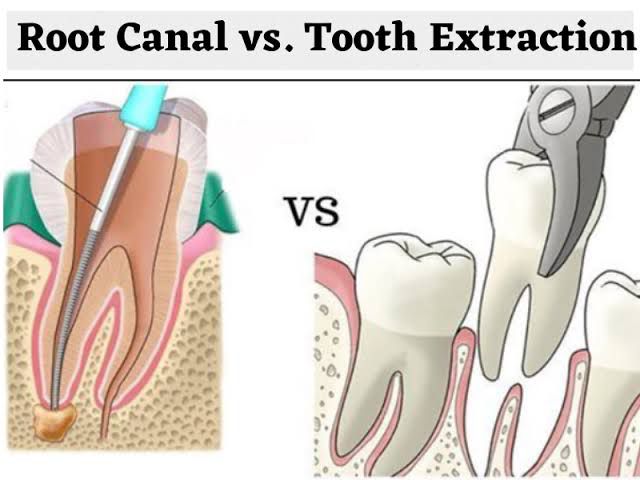When it comes to dealing with severe tooth decay, infection, or damage, most patients face a critical question: Should I get a root canal or have the tooth extracted? Both procedures are common dental treatments, but choosing the right one depends on your specific oral health condition, goals, and budget.
In this article, we’ll break down the differences between root canal and tooth extraction, compare the pros and cons, and help you understand which option may be better for you.
What is a Root Canal?
A root canal treatment is a dental procedure used to save a badly damaged or infected tooth. During the procedure, your dentist or endodontist removes the infected pulp (the soft tissue inside the tooth), cleans the root canals, and seals the tooth to prevent future infection. A crown is usually placed afterward to restore the tooth’s strength and appearance.
Common Reasons for a Root Canal:
- Deep decay or cavities
- Cracked or fractured teeth
- Infection or abscess at the root
- Severe sensitivity or pain
What is Tooth Extraction?
Tooth extraction involves removing the entire tooth from its socket in the bone. It may be necessary when the tooth is too damaged to be saved or poses a risk to surrounding teeth and oral health.
Common Reasons for Tooth Extraction:
- Severely decayed or broken teeth
- Advanced gum disease
- Crowded mouth (orthodontic reasons)
- Impacted or infected wisdom teeth
Root Canal vs. Extraction: Pros and Cons
Let’s take a closer look at how these procedures compare in various aspects:
1. Preservation of Natural Tooth
- Root Canal: Keeps your natural tooth intact. This is beneficial for chewing function, jawbone health, and overall oral balance.
- Extraction: Removes the tooth completely, which can lead to shifting of nearby teeth or bone loss if not replaced with a dental implant or bridge.
✅ Winner: Root Canal
2. Pain and Recovery
- Root Canal: Contrary to common belief, root canals are not painful due to modern anesthetics. Recovery is usually quicker with less post-treatment discomfort.
- Extraction: May involve more post-operative pain, swelling, and a longer healing time, especially if it’s a surgical extraction.
✅ Winner: Root Canal
3. Cost and Follow-Up Treatment
- Root Canal: Generally more expensive upfront, especially when a crown is needed. However, it avoids the additional cost of tooth replacement.
- Extraction: Often less expensive initially, but if you choose to replace the missing tooth (with a bridge or implant), the total cost can be much higher.
✅ Winner: Depends on long-term planning
If you’re not replacing the tooth: Extraction may be cheaper.
If you plan to replace the tooth: Root Canal is more cost-effective in the long run.
4. Function and Appearance
- Root Canal: Maintains the natural structure and appearance of your smile. Chewing function remains normal.
- Extraction: If not replaced, can affect your smile, speech, and chewing ability. Surrounding teeth may shift over time.
✅ Winner: Root Canal
5. Risk of Future Problems
- Root Canal: Slight chance of reinfection if not properly sealed or if oral hygiene is poor.
- Extraction: No risk of future infection in the extracted tooth, but potential complications include bone loss, misalignment, or difficulty eating.
✅ Winner: Depends on the case
When is Tooth Extraction Better?
While saving your natural tooth is usually preferred, there are situations where extraction is the better or only option, such as:
- The tooth is too damaged or decayed to restore
- Severe bone loss due to gum disease
- Recurrent infections despite root canal therapy
- Financial constraints make root canal and crown unaffordable
In such cases, tooth extraction followed by a dental implant or bridge can still offer a healthy, functional smile.
When is Root Canal the Right Choice?
Root canal is the best option when:
- The tooth structure is still strong enough to support a crown
- You want to maintain your natural smile
- You wish to avoid bone loss and shifting of other teeth
- You are committed to good oral hygiene post-treatment
Final Verdict: Which is Better?
The short answer is: It depends on your specific case.
- If the tooth can be saved and you’re looking for long-term oral health and function, a root canal is the better option.
- If the tooth is beyond repair or you’re dealing with severe infection, extraction may be the only viable solution.
The best decision should be made after a thorough examination by your dentist, who can assess the condition of your tooth, explain your options, and guide you toward the most effective treatment.

